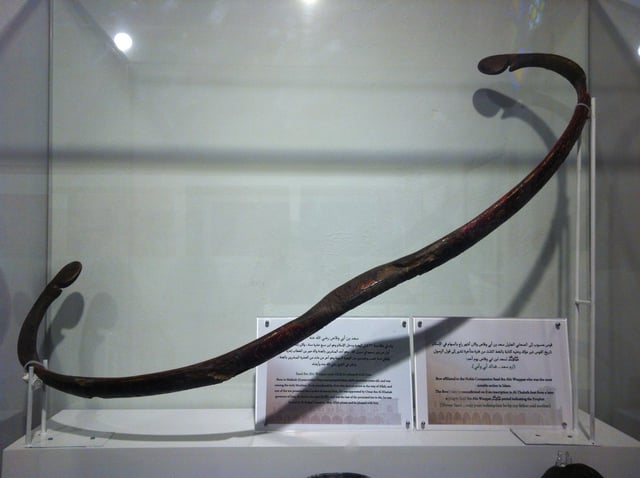Sa`d ibn Abi Waqqas

Sa`d ibn Abi Waqqas

Saʿd ibn Abi Waqqas leads the armies of the Rashidun Caliphate during the Battle of al-Qādisiyyah from a manuscript of the Shahnameh.
Saʿd ibn Abī Waqqās (Arabic: سعد بن أبي وقاص) was one of the companions of the Islamic prophet. Sa'd was the third or fourth person to embrace Islam at the age of seventeen. He is mainly known for his commandership in the Battle of Qadisiyyah and in the conquest of Persia in 636, governorship over it, and diplomatic sojourns to China in 651.
Biography
Family
Sa'd was born in Mecca, 595. His father was Abu Waqqas Malik ibn Uhayb ibn Abd Manaf ibn Zuhrah from the Banu Zuhrah clan of the Quraysh tribe.[1][2] Uhayb ibn Abd Manaf was the paternal uncle of Aminah bint Wahb,[3] mother of Muhammad. Sa'd's mother was Hamnah bint Sufyan ibn Umayya ibn Abd Shams ibn Abd Manaf.[4]
He was seventeen years old when he accepted Islam. He had many children, among whom his sons Umar and Aamir and his daughter A'isha are the most well-known.
During Muhammad's era 610–632
Mothers reaction about Sa'd's conversion to Islam
He was one of the first to accept Islam.[1]
Saʿd relates:
Battles

Bow of Saad bin Abi-Waqqas at Medina railway museum
He fought at the battle of Badr with his young brother ʿUmayr. Being only in his early teens, Umayr was denied access to battle, but after struggling and crying, he was later given permission by Muhammed to fight in battle. Saʿd returned to Medina alone; ʿUmayr was one of the fourteen Muslims who died in the battle.
At the battle of Uhud, Saʿd was chosen as an archer together with Zayd, Saʿīb (the son of Uthmān ibn Mazūn) and others. Saʿd was among those who fought in defense of Muhammad after some Muslims had deserted their positions. Muhammad honoured him by declaring him one of the best archers of that time. During the battle, Muhammad gathered some arrows for him.
Farewell Pilgrimage
He fell ill during the Farewell Pilgrimage, and he had only a daughter during this period. Sa'ad said:
O Messenger of Allah. I have wealth and I only have one daughter to inherit from me. Shall I give two thirds of my wealth as Sadaqah?" "No," replied the Prophet. "Then, (shall I give) a half?." asked Sa'ad and the Prophet again said 'no.' "Then, (shall I give) a third?' asked Sa'ad. "Yes," said the Prophet. "The third is much. Indeed to leave your heirs well-off is better than that you should leave them dependent on and to beg from people. If you spend anything seeking to gain thereby the pleasure of Allah, you will be rewarded for it even if it is a morsel which you place in your wife's mouth.[1]
During Caliph ʿUmar's era 634–644
Sa` ad Ibn Abi Waqqas, was the one who built the city of Kufa in Iraq during the reign Umar ibn al-Khattab.
Saʿd also fought under ʿUmar's command against the Sassanid army at the Battle of al-Qādisiyyah and Battle of Nahāvand. He was later appointed governor of Kufa and Nejd during the caliphate of ʿUmar.
Some narrations state that although ʿUmar deposed him from his post as governor, he recommended that the caliph who succeeded him reinstall Saʿd, since Umar had not deposed Saʿd due to any treachery.[6]
He was one of six people nominated by Umar ibn al-Khattab for the third caliphate.
During Caliph ʿUthman's era 644–656
ʿUthman carried out ʿUmar's recommendation and appointed Saʿd as governor of Kufa.[6]
Saʿd has been traditionally credited by Chinese Muslims with introducing Islam to China in 650, during the reign of Emperor Gaozong of Tang.[7][8] A mosque in the Lalmonirhat District of Bangladesh has also been found, which is said to be built by himself in 648, and also locally called after his name as Abu Akkas mosque.[9][10]
During Caliph Muʿawiyah's era 661–664
He outlived all ten blessed companions, and died a wealthy man at the age of eighty, around the year 674. Sa'd is among the ten promised of paradise.[1]
Legacy
Sunni Muslims regard him as one of the ten to whom paradise was promised.
One Sunni source states: To urge him on [during Uhud], Muhammad said: "Shoot, Saʿd ...may my mother and father be your ransom.". This was also reported by ʿAli ibn Abi Talib who said that he had not yet heard Muhammad promising such a ransom to anyone except Sa'ad Bin Malik. Bukhari, Volume 5, Book 59, Number 389. Sa'ad bin Malik and Saʿd bin abi Waqqas are the same person.
See also
Saad
Sunni view of the Sahaba
Emperor Gaozong of Tang